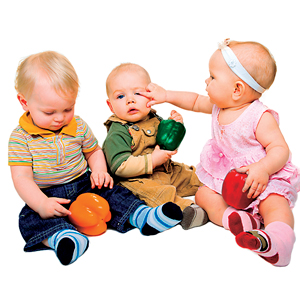 About halfway through my freshman year of high school, I took on a babysitting job that was way over my head. A friendly mom asked if I would watch her 15-month-old for a few hours so she and her husband could go out to dinner. Seemed simple enough. Heck, I had cared for sick 3-year-old twins, newborns, five kids all at once. I could handle one 15-month-old.
About halfway through my freshman year of high school, I took on a babysitting job that was way over my head. A friendly mom asked if I would watch her 15-month-old for a few hours so she and her husband could go out to dinner. Seemed simple enough. Heck, I had cared for sick 3-year-old twins, newborns, five kids all at once. I could handle one 15-month-old.
Except I was not prepared for what I faced when my dad dropped me off to babysit. The 15-month-old suffered from a very serious heart condition and was connected to a large medical machine that needed to be adjusted regularly when his heart stopped beating. I was instructed on how to handle the various beeps and alarms on the machine, and whoosh! – the parents were out the door to their dinner.
Fortunately, I was able to perform the necessary button-pushing, and my charge was safe and sound when his parents returned. But when I think back to that stressful evening, the mother in me is appalled at the safety risks I faced that evening, and the attorney in me cringes at the liabilities I faced. And still, beyond the babysitting years, we parents deal with safety and liability issues all the time while watching friends’ kids. Here’s what you need to know.
Be reasonable! I know, it sounds a bit simplistic. But the hinge issue in many liability cases is whether or not the responsible party acted reasonably. For most types of injuries, you must engage in negligent behavior to be found liable for an injury. And negligence can most easily be understood as a failure to behave as a reasonably prudent person would behave in your shoes.
Medical issues. Be sure to inquire about any potential medical conditions, including allergies. If the child has an EpiPen or other prescription, ask for explicit instructions on how to administer the medicine. And unless you are comfortable with the situation, politely decline to care for the child. In the wake of the tragic death of a child in Chesterfield, there has been a lot of discussion about the use of EpiPens. Legally, yes, you are open to liability if you administer an EpiPen or other drugs and an injury results. You should only agree to care for the child if you are willing to assume the responsibility and act accordingly in an emergency situation. And, as always, call 911 if any life-threatening situation arises.
Driving. We all remember climbing around the back of our parents’ cars as children, unrestrained by car seats, booster seats, and seat belts. I even recall a friend’s parents letting us haul an air mattress and sleeping bags into the back of their pickup truck for a brief ride around town (I know!). Thankfully, we now know better. Virginia requires children under eight to be placed in car safety seats approved by the US Department of Transportation. If you will be transporting a child in your car, obviously you need to comply with the requirements, but doing so in a way that ensures the safety of the child – and protects your liability – is a bit trickier.
Installing a car seat correctly is no small feat. There are buckles, straps, and latches, and they need to be tightened in such a way that usually requires minor acrobatic maneuvers on the part of the installer. Suffice it to say that installation is complicated and important to safety. Unless you have the car seat manual and feel confident that you can install it correctly, it’s best to let parents complete installation of their children’s car seats in your car. And, if that’s not feasible, call your local fire department; many of them have specially-trained personnel who can check and install child safety seats, for free.
Supervision. Virginia law dictates that adults who agree to supervise a minor child have a duty to exercise reasonable care during that supervision. This requirement is somewhat vague and is interpreted on a case-by-case basis, but some general rules can apply. Don’t leave any child unattended near a body of water, provide constant supervision of young children, don’t allow children to play with hazardous items. In other words, provide good care.
Again, it all comes down to one guiding principle: Be reasonably prudent. Can you protect yourself from all liabilities? No. And we do live in a litigious society, so that’s a risk you take when you agree to care for a minor child. But that doesn’t mean you should refuse to care for a friend’s child. One of my daughter’s favorite activities is having her buddy, Adele, over to play so the two of them can construct a make believe jungle, complete with face painting, costumes, and habitats for the stuffed animals. I wouldn’t miss that for the world, liabilities and all.





